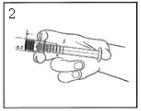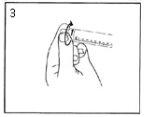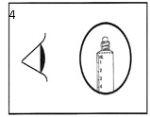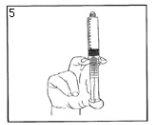

FENILEFRINA AGUETTANT 50 microgramas/mL Solução Injetável em Seringa Pré-carregada

Pergunte a um médico sobre a prescrição de FENILEFRINA AGUETTANT 50 microgramas/mL Solução Injetável em Seringa Pré-carregada

Como usar FENILEFRINA AGUETTANT 50 microgramas/mL Solução Injetável em Seringa Pré-carregada
Introdução
Prospecto: informação para o paciente
Fenilefrina Aguettant 50 microgramas/ml solução injetável em seringa precarregada
(Doravante denominada“Fenilefrina injetável”)
Fenilefrina
Leia todo o prospecto atentamente antes deque lhe administremeste medicamento, porque contém informações importantes para si.
- Conserva este prospecto, porque pode ter que voltar a lê-lo. Se tiver alguma dúvida, consulte o seu médico, farmacêutico ou enfermeiro.
- Se experimentar efeitos adversos, consulte o seu médico, farmacêutico ou enfermeiro, mesmo que se trate de efeitos adversos que não aparecem neste prospecto. Ver secção 4.
Conteúdo do prospecto
- O que é Fenilefrina injetável e para que é utilizada
- O que precisa saber antes de que lhe administrem Fenilefrina injetável
- Como se administra Fenilefrina injetável
- Possíveis efeitos adversos
- Conservação de Fenilefrina injetável
- Conteúdo do envase e informação adicional
1. O que é Fenilefrina injetável e para que é utilizada
Este medicamento faz parte de um grupo de agentes adrenérgicos e dopaminérgicos.
É utilizado para tratar a pressão arterial baixa durante a anestesia.
2. O que precisa saber antes de que lhe administrem Fenilefrina injetável
Não lhe administrarão Fenilefrina injetável:
- Se for alérgico ao cloridrato de fenilefrina ou a algum dos outros componentes deste medicamento (incluídos na secção 6);
- Se sofrer de pressão arterial extremamente alta ou doença vascular periférica (má circulação);
- Se estiver a tomar um inibidor da monoaminooxidase (IMAO) (ou nas 2 semanas seguintes à sua retirada), que é utilizado para tratar a depressão (como iproniazida, nialamida);
- Se apresentar uma glândula tiroideia extremamente hiperativa (hipertireoidismo).
Advertências e precauções
Consulte o seu médico, farmacêutico ou enfermeira antes de começar a usar Fenilefrina injetável:
- Se for de idade avançada;
- Se for diabético;
- Se sofrer de hipertensão arterial;
- Se apresentar uma glândula tiroideia hiperativa (hipertireoidismo não controlado);
- Se tiver uma doença dos vasos sanguíneos, como a arteriosclerose (endurecimento e espessamento das paredes dos vasos sanguíneos);
- Se sofrer de má circulação sanguínea no cérebro;
- se sofrer de doença cardíaca, incluindo doenças crónicas do coração, insuficiência vascular periférica, distúrbios do ritmo cardíaco, taquicardia (frequência cardíaca elevada), bradicardia (frequência cardíaca baixa), bloqueio cardíaco parcial, angina de peito;
- Se sofrer de um glaucoma de ângulo fechado (uma doença dos olhos pouco comum).
Em pacientes com insuficiência cardíaca grave, a fenilefrina poderá agravar a insuficiência cardíaca devido à constrição dos vasos sanguíneos.
A sua pressão arterial será monitorizada durante o tratamento. Se sofrer de doença cardíaca, será realizada uma monitorização adicional das suas funções vitais.
Crianças
Não se recomenda o uso deste medicamento em crianças devido à existência de dados insuficientes sobre a sua eficácia, segurança e recomendações de dosagem.
Uso de Fenilefrina injetável com outros medicamentos
Informa o seu médico se está a utilizar, utilizou recentemente ou poderá ter que utilizar qualquer outro medicamento, tais como:
- alguns antidepressivos (iproniazida, nialamida, moclobemida, toloxatona, imipramina, milnaciprano ou venlafaxina);
- medicamentos utilizados para tratar infecções (linezolida);
- alguns medicamentos utilizados para tratar enxaquecas (dihidroergotamina, ergotamina, metilergometrina, metisergida);
- alguns medicamentos utilizados para tratar a doença de Parkinson (bromocriptina, lisurida, pergolida);
- medicamento utilizado para inibir a produção de uma hormona responsável pela lactação (cabergolina);
- anestesia inalada (desflurano, enflurano, halotano, isoflurano, metoxiflurano, sevoflurano);
- medicamentos utilizados como supressores do apetite (sibutramina);
- medicamentos usados para tratar a hipertensão arterial (guanetidina);
- medicamentos usados para tratar a insuficiência cardíaca e algumas arritmias (glicósidos cardíacos);
- medicamentos utilizados para tratar ritmos cardíacos anormais (quinidina);
- medicamentos utilizados durante o parto (ocitocina).
Gravidez e amamentação
Não foi estabelecida a segurança deste medicamento durante a gravidez e a amamentação, mas o uso de Fenilefrina injetável é possível durante a gravidez se for necessário.
Não se recomenda o uso deste medicamento durante a amamentação. No entanto, a amamentação é possível se for administrada uma única vez durante o parto.
Se estiver grávida ou em período de amamentação, acredita que possa estar grávida ou tem intenção de engravidar, consulte o seu médico, farmacêutico ou enfermeiro antes de utilizar este medicamento.
Condução e uso de máquinas
Fale com o seu médico se deseja conduzir ou usar máquinas após ter usado este medicamento.
Fenilefrina injetável contém sódio
Este medicamento contém 37,2 mg de sódio (componente principal do sal de cozinha) em cada seringa. Isto equivale a 1,9% da ingestão diária máxima de sódio recomendada para um adulto.
3. Como se administra Fenilefrina injetável
A administração será realizada por um profissional de saúde com a formação adequada e a experiência, que decidirá a dosagem correta para si e quando e como deve ser administrada a injeção.
As doses recomendadas são:
Uso em adultos
O seu médico determinará a dose que será administrada e pode ser repetida ou ajustada até obter o efeito desejado.
Uso em pacientes com insuficiência renal(os rins não funcionam bem)
Doses mais baixas de fenilefrina podem ser necessárias em pacientes com insuficiência renal.
Uso em pacientes com insuficiência hepática(o fígado não funciona bem)
Os pacientes com cirrose do fígado podem necessitar de doses mais elevadas de fenilefrina.
Uso em pacientes de idade avançada
O tratamento em pessoas de idade avançada deve ser realizado com cuidado.
Uso em crianças
Não se recomenda o uso deste medicamento em crianças devido à existência de dados insuficientes sobre a sua eficácia, segurança e recomendações de dosagem.
Se lhe foi administrada mais Fenilefrina injetável do que o deveria:
Pode ter os seguintes sintomas: palpitações, distúrbios do ritmo cardíaco (taquicardia, arritmias cardíacas).
Para mais informações sobre o uso deste medicamento, consulte o seu médico, farmacêutico ou enfermeiro.
4. Possíveis efeitos adversos
Como todos os medicamentos, este medicamento pode produzir efeitos adversos, embora nem todas as pessoas os sofram.
Alguns efeitos adversos podem ser graves (frequência não conhecida). Comunique ao seu médico imediatamente se experimentar algum destes sintomas:
- dor no peito ou dor devido à angina;
- ritmo cardíaco irregular;
- sente o coração a sair do peito;
- hemorragia cerebral (distúrbio da fala, tonturas, paralisia de um lado do corpo);
- psicose (perda do contacto com a realidade);
Outros efeitos adversos podem incluir (frequência não conhecida):
- reação de hipersensibilidade (alergia);
- dilatação excessiva das pupilas;
- aumento da pressão ocular (piora do glaucoma);
- excitabilidade (sensibilidade excessiva de um órgão ou parte do corpo);
- agitação (inquietude);
- ansiedade;
- confusão;
- dor de cabeça;
- nervosismo;
- insónia (dificuldade em adormecer ou manter o sono);
- trejeções;
- ardor da pele;
- picazón da pele;
- picazón ou sensação de formigueiro da pele (parestesia);
- ritmo cardíaco lento ou rápido;
- hipertensão arterial;
- dificuldade respiratória;
- fluidos nos pulmões;
- náuseas;
- vómitos;
- sudores;
- palidez da pele (cor pálida da pele);
- carne de galinha;
- dano do tecido no local da injeção;
- debilidade muscular;
- dificuldade em urinar ou retenção de urina.
Comunicação de efeitos adversos
Se experimentar qualquer tipo de efeito adverso, consulte o seu médico, farmacêutico ou enfermeiro, mesmo que se trate de possíveis efeitos adversos que não aparecem neste prospecto. Também pode comunicá-los directamente através do Sistema Espanhol de Farmacovigilância de Medicamentos de Uso Humano: https://www.notificaram.es. Mediante a comunicação de efeitos adversos, pode contribuir para proporcionar mais informações sobre a segurança deste medicamento.
5. Conservação de Fenilefrina injetável
Mantenha este medicamento fora da vista e do alcance das crianças.
Não utilize este medicamento após a data de validade que aparece no envase e na etiqueta da seringa após CAD. A data de validade é o último dia do mês que se indica.
Este medicamento não requer qualquer temperatura especial de conservação.
Conserva o blister no embalagem exterior para protegê-lo da luz. Mantenha a seringa no blister perfeitamente fechado.
Não use este medicamento se observar sinais visíveis de deterioração.
Qualquer seringa, mesmo que tenha sido utilizada parcialmente, deve ser eliminada após o uso.
Os medicamentos não devem ser jogados nos esgotos nem na lixeira. Pergunte ao seu farmacêutico como se livrar dos envases e dos medicamentos que não precisa. Dessa forma, ajudará a proteger o meio ambiente.
6. Conteúdo do envase e informação adicional
Composição de Fenilefrina injetável
O princípio ativo é o cloridrato de fenilefrina.
- Cada ml da solução injetável contém cloridrato de fenilefrina, equivalente a 50 microgramas de fenilefrina.
- Cada seringa precarregada de 10 ml contém cloridrato de fenilefrina, equivalente a 500 microgramas de fenilefrina.
- Os outros componentes são cloreto de sódio, citrato de sódio, ácido cítrico monohidratado, hidróxido de sódio e água para preparações injetáveis.
Aspecto do produto e conteúdo do envase
Fenilefrina injetável é uma solução transparente incolor, em uma seringa precarregada de polipropileno de 10 ml, envasada individualmente em um blister transparente.
As seringas precarregadas estão disponíveis em caixas de 1 e 10 seringas.
Pode ser que apenas alguns tamanhos de envases estejam comercializados.
Titular da autorização de comercialização e responsável pela fabricação
LABORATOIRE AGUETTANT
1 rue Alexander Fleming, Parc Scientifique Tony Garnier
69007 Lyon- França
Laboratoire AGUETTANT
Lieu-Dit « Chantecaille »
07340 Champagne
França
Representante Local:
AGUETTANT IBÉRICA
C/Pau Claris, 139, Pral. 2
08009, Barcelona-Espanha
Data da última revisão deste prospecto:Setembro 2020
A informação detalhada e actualizada deste medicamento está disponível na página web da Agência Espanhola de Medicamentos e Produtos Sanitários (AEMPS) http://www.aemps.gob.es/
Esta informação está destinada unicamente a profissionais do sector sanitário:
Prepare a seringa cuidadosamente como se indica a seguir
A seringa precarregada é para um único paciente. Elimine a seringa após o uso. Não a reutilize.
O conteúdo de um blister que não esteja aberto nem danificado é estéril e não deve ser aberto até o momento do uso.
Deve ser inspecionado visualmente o produto, para comprovar que não há partículas nem alteração de cor antes da administração. Só deve ser utilizada a solução quando esta for transparente, incolor e livre de partículas ou precipitados.
O produto não deve ser utilizado se o selo de segurança da seringa estiver quebrado.
A superfície exterior da seringa é estéril até que se abra o blister.
Quando se utiliza usando um método asséptico, Fenilefrina Aguettant 50 microgramas/ml solução injetável em seringa precarregada pode ser colocada em um campo estéril.
- Retire a seringa precarregada do blister estéril.
|
|
|
|
|
|
|
|
- Conecte a seringa ao acesso intravenoso. Empurre o êmbolo lentamente para injetar o volume necessário.
- A eliminação do medicamento não utilizado ou dos materiais de descarte deve ser realizada de acordo com os requisitos locais.
- País de registo
- Substância ativa
- Requer receita médicaSim
- Fabricante
- Esta informação é apenas para referência e não constitui aconselhamento médico. Consulte sempre um médico antes de tomar qualquer medicamento. A Oladoctor não se responsabiliza por decisões médicas baseadas neste conteúdo.
- Alternativas a FENILEFRINA AGUETTANT 50 microgramas/mL Solução Injetável em Seringa Pré-carregadaForma farmacêutica: INJETÁVEL, 100 microgramas/mlSubstância ativa: phenylephrineFabricante: Laboratoire AguettantRequer receita médicaForma farmacêutica: INJETÁVEL, 0,1 mg/mlSubstância ativa: phenylephrineFabricante: Altan Pharmaceuticals SaRequer receita médicaForma farmacêutica: INJETÁVEL, 10 mg/mLSubstância ativa: phenylephrineFabricante: Altan Pharmaceuticals SaRequer receita médica
Alternativas a FENILEFRINA AGUETTANT 50 microgramas/mL Solução Injetável em Seringa Pré-carregada noutros países
As melhores alternativas com o mesmo princípio ativo e efeito terapêutico.
Alternativa a FENILEFRINA AGUETTANT 50 microgramas/mL Solução Injetável em Seringa Pré-carregada em Polónia
Alternativa a FENILEFRINA AGUETTANT 50 microgramas/mL Solução Injetável em Seringa Pré-carregada em Ukraine
Médicos online para FENILEFRINA AGUETTANT 50 microgramas/mL Solução Injetável em Seringa Pré-carregada
Avaliação de posologia, efeitos secundários, interações, contraindicações e renovação da receita de FENILEFRINA AGUETTANT 50 microgramas/mL Solução Injetável em Seringa Pré-carregada – sujeita a avaliação médica e regras locais.














